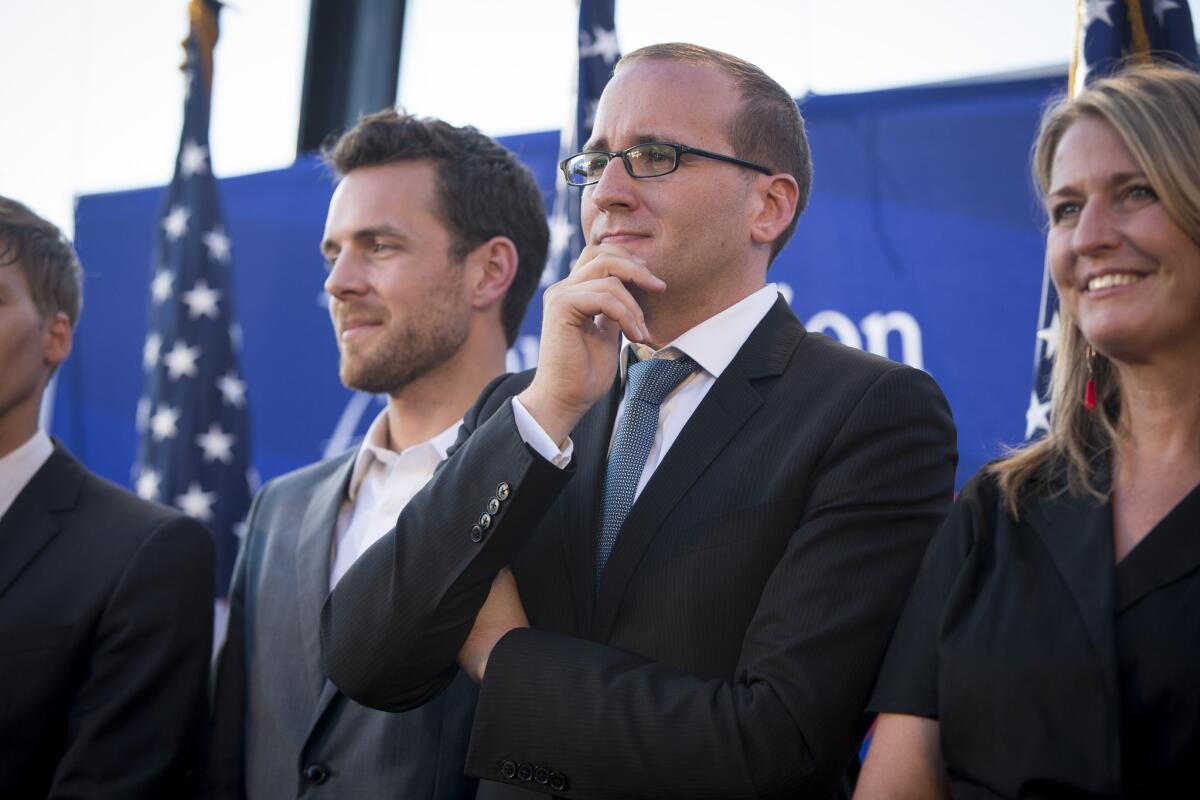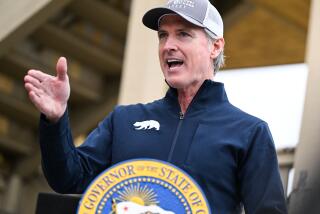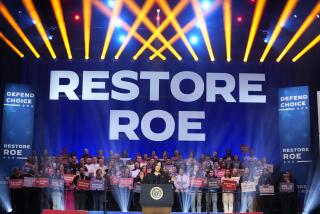Chad Griffin and the fight against Prop. 8

He cut his teeth in the Clinton White House and on California issues: the campaign to save Ahmanson Ranch, the fight for an oil extraction tax and funding for stem cell research. He raised money to elect Barack Obama. And then came Proposition 8. Chad Griffin, political consultant, PR sachem and, lately, head of the Human Rights Campaign, orchestrated the legal battle to get it tossed out. A week ago his side — and, to his mind, the American principle of equality — won in the Supreme Court. As the language has morphed from “gay marriage” to “same-sex marriage” to “marriage equality,” so has the public sensibility — and Griffin’s skill at anticipating and tapping into it.
Where were you when the gay marriage rulings came down?
I was seated in the Supreme Court with our four [Proposition 8] plaintiffs. Silence is enforced in that courtroom. You can hear a pin drop.
VIDEO: Understanding the Prop. 8 and DOMA decisions
First the DOMA decision was read, and then we moved to the Proposition 8 ruling. You hang onto each sentence because you think perhaps the next sentence is going to undermine the previous one. It wasn’t until the judges finished reading that the magnitude became clear. You heard the gavel go down. All stood in silence again, and we walked out with teary eyes and knots in our throats. We walked to the front door and began to descend those stairs, and two or three steps down you heard the roar of the world, the thousands who had gathered out front. It was an incredible moment.
I saw you on television taking a call from the president.
The call I will never forget! It was the Air Force One operator calling. The plaintiffs [Kris Perry and Sandy Stier] were next to me live on MSNBC, and once I knew it was the president, a staffer pulled me into the live shot where the president was able to talk to us on speaker phone. It’s not easy to make me nervous, but you could see my hand shaking. The president thanked me and our plaintiffs for the courage we had to bring this case and the thousands of lives that will be impacted.
TIMELINE: Gay marriage chronology
Same-sex marriages resumed in California on Friday. Some said the 9th Circuit should have waited to lift its stay until the 25 days for appeal ended.
They did not take away the 25-day period. [But] there is no question about the legality [of resuming marriages].
Like Bill Clinton, you’re from Hope, Ark. His epiphany was about racial segregation; yours was about sexuality.
FULL COVERAGE: Prop. 8 and DOMA
I went to public schools every day. I went to church on Sunday morning, Sunday night and Wednesday night. I never knew that I knew another gay person. I was deeply closeted even to myself. I had a wonderful life, and I have great family and friends, but I knew what halls not to walk down, what table not to sit at in the lunchroom because I heard the word “queer.”
To me it serves as the constant reminder of why we fight this fight. We’ve made great strides, but a young gay kid in Hope or in Altoona, Pa., lies awake at night fearing potential doom the next day. It’s for that young person we are fighting.
I find it so outrageous that anyone would try to use religion as justification for discrimination. Regardless of what faith anyone grew up in, you learn the golden rule: Treat others as you wish to be treated.
Where I grew up, your life happened in three places: home, school and church. If any one of those was screwed up, you had a really difficult time. Today there’s a fourth: the Internet. Oftentimes a young person hears hate from the pulpit, is bullied at school, sometimes rejected by their own parents. The Internet is actually one of the places where a young LGBT person finds acceptance and peer and support groups.
What accounts for the speed of the legal recognition of same-sex marriage compared to, say, women’s suffrage or the abolition of slavery?
Harvey Milk said it first in the 1970s: The most important thing we can do is come out of the closet. Come out to your family and co-workers. When they get to know you, they will most likely not discriminate or think you should be treated as less than them. We’re at a point where 9 out of 10 Americans say they have someone close to them who is LGBT. That one, they know someone too — they just don’t know that they know it.
Having [former Bush administration Solicitor General] Ted Olson and [Al Gore’s attorney in Bush vs. Gore] David Boies together [arguing against Proposition 8] allowed us to lift the partisan veil and shine the spotlight on the human face. For the first time in the history of this movement, we put discrimination on trial.
When we began this case, the only high-profile Republican who supported marriage equality was former Vice President Cheney, for very personal reasons. Look where we are today. And you have to give incredible credit to the entertainment industry. It’s played a central role in moving public opinion: “Modern Family,” Ellen DeGeneres, [“Will & Grace” co-creator] Max Mutchnick, David Geffen, Steve Bing, Michele and Rob Reiner.
What responses from straight people surprised you?
For [Supreme Court] oral arguments, we asked people to change their Facebook profiles to the Human Rights Campaign’s red logo, and more than 3 million people did. A young soldier from Texas, stationed outside Little Rock, from a Southern Baptist family — when he came out of the closet, his mother did not accept it and asked that he not tell any other family members. As we were going to oral arguments, she changed her Facebook profile to that red logo.
Why do some people resist comparison to the civil rights movement?
The civil rights leaders I’m close to don’t. There are always people who will disagree. There are certainly differences from the women’s rights movement to the African American civil rights movement, but we have been on a constant path to treat all of our citizens as full and equal.
Our opponents ran a misleading and inaccurate and homophobic campaign. I’ve been involved in a lot of political campaigns; there are two sides to a lot of campaigns and you fight it out. This was not that case. [The other side] had nothing but outright lies and used scare tactics. I think most of those involved in that campaign will probably regret [it] in the long term. Even George Wallace changed his mind.
Proposition 8 proponents say this is not the end of the battle.
This battle is over in California. Our opponents are losing in federal court, at the ballot box, in the state court, in the court of public opinion.
The vast majority of this country is now supportive of marriage equality. Being on the wrong side of history as it relates to this issue has become an increasingly isolated place to be.
Where is your next battleground?
Moving into the states. We now have two Americas: 30% of Americans live in states where they’re legally able to get the rights and privileges and protections of marriage, and 70% live in the other 37 states. It’s our job to ensure equality reaches everyone.
Some straight people pledged not to marry until gay people could.
The day of reckoning is here!
Follow Patt Morrison on Twitter @pattmlatimes
This interview was edited and excerpted from a taped transcript. An archive of Morrison’s interviews can be found at latimes.com/pattasks.
More to Read
Start your day right
Sign up for Essential California for news, features and recommendations from the L.A. Times and beyond in your inbox six days a week.
You may occasionally receive promotional content from the Los Angeles Times.







